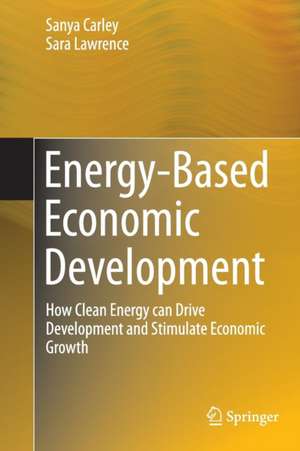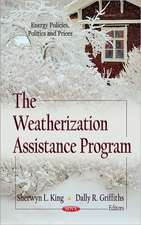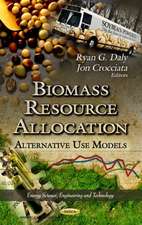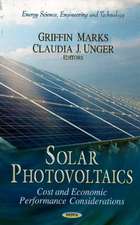Energy-Based Economic Development: How Clean Energy can Drive Development and Stimulate Economic Growth
Autor Sanya Carley, Sara Lawrenceen Limba Engleză Paperback – 3 sep 2016
Energy-based economic development: How clean energy can drive development and stimulate economic growth delivers working definitions, common approaches, descriptions of supportive policy mechanisms, and suggested metrics for evaluation. The book offers a unified framework for EBED that is supported by examples and leaves readers better equipped to design, plan, and implement EBED initiatives. Case studies illustrate how national and subnational initiatives adopt to a locale’s energy asset base, energy and economic development needs, and the context in which the initiative operates. Descriptions of the energy projects supported by the American Recovery and Reinvestment Act offer insights about what worked and what did not and suggest ways in which governments can be better prepared to manage EBED projects in the future.
This book provides the tools necessary to work toward simultaneous energy and economic development goals and facilitates discussion for an advanced policy agenda of energy efficiency, energy diversification, innovation-led economic growth, and job creation.
| Toate formatele și edițiile | Preț | Express |
|---|---|---|
| Paperback (1) | 381.43 lei 43-57 zile | |
| SPRINGER LONDON – 3 sep 2016 | 381.43 lei 43-57 zile | |
| Hardback (1) | 388.72 lei 43-57 zile | |
| SPRINGER LONDON – apr 2014 | 388.72 lei 43-57 zile |
Preț: 381.43 lei
Nou
Puncte Express: 572
Preț estimativ în valută:
72.98€ • 76.41$ • 60.39£
72.98€ • 76.41$ • 60.39£
Carte tipărită la comandă
Livrare economică 07-21 aprilie
Preluare comenzi: 021 569.72.76
Specificații
ISBN-13: 9781447169406
ISBN-10: 1447169409
Pagini: 179
Ilustrații: XIV, 165 p. 13 illus.
Dimensiuni: 155 x 235 x 10 mm
Greutate: 0.26 kg
Ediția:Softcover reprint of the original 1st ed. 2014
Editura: SPRINGER LONDON
Colecția Springer
Locul publicării:London, United Kingdom
ISBN-10: 1447169409
Pagini: 179
Ilustrații: XIV, 165 p. 13 illus.
Dimensiuni: 155 x 235 x 10 mm
Greutate: 0.26 kg
Ediția:Softcover reprint of the original 1st ed. 2014
Editura: SPRINGER LONDON
Colecția Springer
Locul publicării:London, United Kingdom
Cuprins
Energy-Based Economic Development: Definition of the Field.- A History of Energy-Based Economic Development.- Energy-Based Economic Development Activities and Approaches.- Case Study Review: What We Have Learned from Examples of Current and Recent Practice.- ARRA Funding Successes and Limitations.- Experiences from the Field: Survey Results from Implementing Organizations.- Energy-Based Economic Development in an International Context: Energy Service Provision.
Notă biografică
Sanya Carley is an assistant professor at the School of Public and Environmental Affairs, at Indiana University. Her research interests include the sustainability of the electricity sector, the effectiveness of energy policy instruments, and the overlap between energy and economic development. Her professional experience outside academia includes approximately eight years of consulting work with economic development organizations, including the World Bank and RTI International, as well as environmental and energy policy organizations, such as the Nicholas Institute, ARCeconomics, and the Environmental Protection Agency.
Sara Lawrence is a senior economic development analyst at RTI International. She works in a variety of settings linking innovation and cross-cutting disciplines into economic development practice. Her research interests are regional development, emerging economies, and leadership.
Sara Lawrence is a senior economic development analyst at RTI International. She works in a variety of settings linking innovation and cross-cutting disciplines into economic development practice. Her research interests are regional development, emerging economies, and leadership.
Textul de pe ultima copertă
Energy is becoming a prominent driver of economic development. Each year, billions of dollars are invested around the world by the public and private sectors in low-emissions energy development and energy efficiency planning. Energy-based economic development (EBED) is a domain that seizes the opportunities inherent in clean energy development to drive innovation and generate economic growth.
Energy-based economic development: How clean energy can drive development and stimulate economic growth delivers working definitions, common approaches, descriptions of supportive policy mechanisms, and suggested metrics for evaluation. The book offers a unified framework for EBED that is supported by examples and leaves readers better equipped to design, plan, and implement EBED initiatives. Case studies illustrate how national and subnational initiatives adopt to a locale’s energy asset base, energy and economic development needs, and the context in which the initiative operates. Descriptions of the energy projects supported by the American Recovery and Reinvestment Act offer insights about what worked and what did not and suggest ways in which governments can be better prepared to manage EBED projects in the future.
This book provides the tools necessary to work toward simultaneous energy and economic development goals and facilitates discussion for an advanced policy agenda of energy efficiency, energy diversification, innovation-led economic growth, and job creation.
Energy-based economic development: How clean energy can drive development and stimulate economic growth delivers working definitions, common approaches, descriptions of supportive policy mechanisms, and suggested metrics for evaluation. The book offers a unified framework for EBED that is supported by examples and leaves readers better equipped to design, plan, and implement EBED initiatives. Case studies illustrate how national and subnational initiatives adopt to a locale’s energy asset base, energy and economic development needs, and the context in which the initiative operates. Descriptions of the energy projects supported by the American Recovery and Reinvestment Act offer insights about what worked and what did not and suggest ways in which governments can be better prepared to manage EBED projects in the future.
This book provides the tools necessary to work toward simultaneous energy and economic development goals and facilitates discussion for an advanced policy agenda of energy efficiency, energy diversification, innovation-led economic growth, and job creation.
Caracteristici
Defines the convergence of the fields of energy policy and planning and economic development Presents a framework for describing and designing energy-based economic development approaches Outlines a taxonomy of different types of energy-based economic development projects, and assesses various case studies as examples in practice Includes supplementary material: sn.pub/extras














